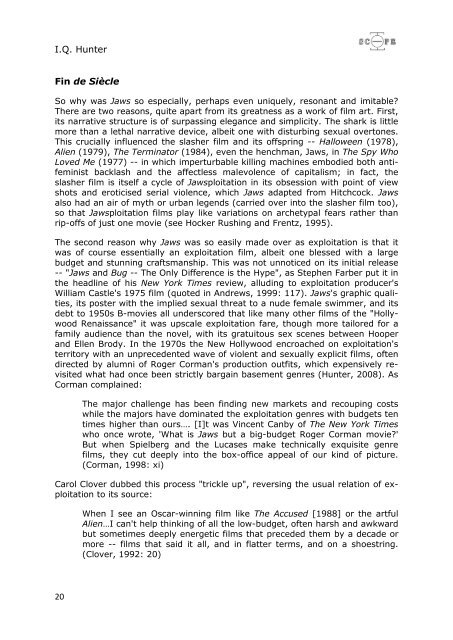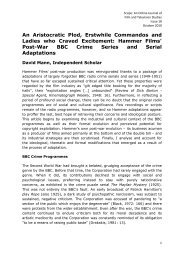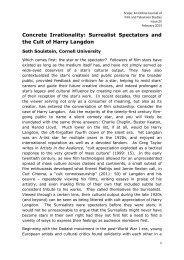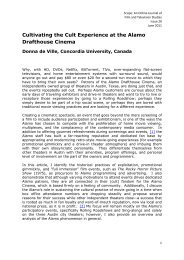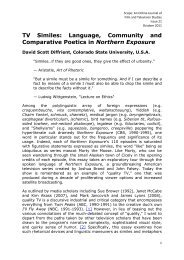Chapter in e-Book - Scope - University of Nottingham
Chapter in e-Book - Scope - University of Nottingham
Chapter in e-Book - Scope - University of Nottingham
You also want an ePaper? Increase the reach of your titles
YUMPU automatically turns print PDFs into web optimized ePapers that Google loves.
I.Q. Hunter<br />
F<strong>in</strong> de Siècle<br />
So why was Jaws so especially, perhaps even uniquely, resonant and imitable?<br />
There are two reasons, quite apart from its greatness as a work <strong>of</strong> film art. First,<br />
its narrative structure is <strong>of</strong> surpass<strong>in</strong>g elegance and simplicity. The shark is little<br />
more than a lethal narrative device, albeit one with disturb<strong>in</strong>g sexual overtones.<br />
This crucially <strong>in</strong>fluenced the slasher film and its <strong>of</strong>fspr<strong>in</strong>g -- Halloween (1978),<br />
Alien (1979), The Term<strong>in</strong>ator (1984), even the henchman, Jaws, <strong>in</strong> The Spy Who<br />
Loved Me (1977) -- <strong>in</strong> which imperturbable kill<strong>in</strong>g mach<strong>in</strong>es embodied both antifem<strong>in</strong>ist<br />
backlash and the affectless malevolence <strong>of</strong> capitalism; <strong>in</strong> fact, the<br />
slasher film is itself a cycle <strong>of</strong> Jawsploitation <strong>in</strong> its obsession with po<strong>in</strong>t <strong>of</strong> view<br />
shots and eroticised serial violence, which Jaws adapted from Hitchcock. Jaws<br />
also had an air <strong>of</strong> myth or urban legends (carried over <strong>in</strong>to the slasher film too),<br />
so that Jawsploitation films play like variations on archetypal fears rather than<br />
rip-<strong>of</strong>fs <strong>of</strong> just one movie (see Hocker Rush<strong>in</strong>g and Frentz, 1995).<br />
The second reason why Jaws was so easily made over as exploitation is that it<br />
was <strong>of</strong> course essentially an exploitation film, albeit one blessed with a large<br />
budget and stunn<strong>in</strong>g craftsmanship. This was not unnoticed on its <strong>in</strong>itial release<br />
-- "Jaws and Bug -- The Only Difference is the Hype", as Stephen Farber put it <strong>in</strong><br />
the headl<strong>in</strong>e <strong>of</strong> his New York Times review, allud<strong>in</strong>g to exploitation producer's<br />
William Castle's 1975 film (quoted <strong>in</strong> Andrews, 1999: 117). Jaws's graphic qualities,<br />
its poster with the implied sexual threat to a nude female swimmer, and its<br />
debt to 1950s B-movies all underscored that like many other films <strong>of</strong> the "Hollywood<br />
Renaissance" it was upscale exploitation fare, though more tailored for a<br />
family audience than the novel, with its gratuitous sex scenes between Hooper<br />
and Ellen Brody. In the 1970s the New Hollywood encroached on exploitation's<br />
territory with an unprecedented wave <strong>of</strong> violent and sexually explicit films, <strong>of</strong>ten<br />
directed by alumni <strong>of</strong> Roger Corman's production outfits, which expensively revisited<br />
what had once been strictly barga<strong>in</strong> basement genres (Hunter, 2008). As<br />
Corman compla<strong>in</strong>ed:<br />
20<br />
The major challenge has been f<strong>in</strong>d<strong>in</strong>g new markets and recoup<strong>in</strong>g costs<br />
while the majors have dom<strong>in</strong>ated the exploitation genres with budgets ten<br />
times higher than ours…. [I]t was V<strong>in</strong>cent Canby <strong>of</strong> The New York Times<br />
who once wrote, 'What is Jaws but a big-budget Roger Corman movie?'<br />
But when Spielberg and the Lucases make technically exquisite genre<br />
films, they cut deeply <strong>in</strong>to the box-<strong>of</strong>fice appeal <strong>of</strong> our k<strong>in</strong>d <strong>of</strong> picture.<br />
(Corman, 1998: xi)<br />
Carol Clover dubbed this process "trickle up", revers<strong>in</strong>g the usual relation <strong>of</strong> exploitation<br />
to its source:<br />
When I see an Oscar-w<strong>in</strong>n<strong>in</strong>g film like The Accused [1988] or the artful<br />
Alien…I can't help th<strong>in</strong>k<strong>in</strong>g <strong>of</strong> all the low-budget, <strong>of</strong>ten harsh and awkward<br />
but sometimes deeply energetic films that preceded them by a decade or<br />
more -- films that said it all, and <strong>in</strong> flatter terms, and on a shoestr<strong>in</strong>g.<br />
(Clover, 1992: 20)


